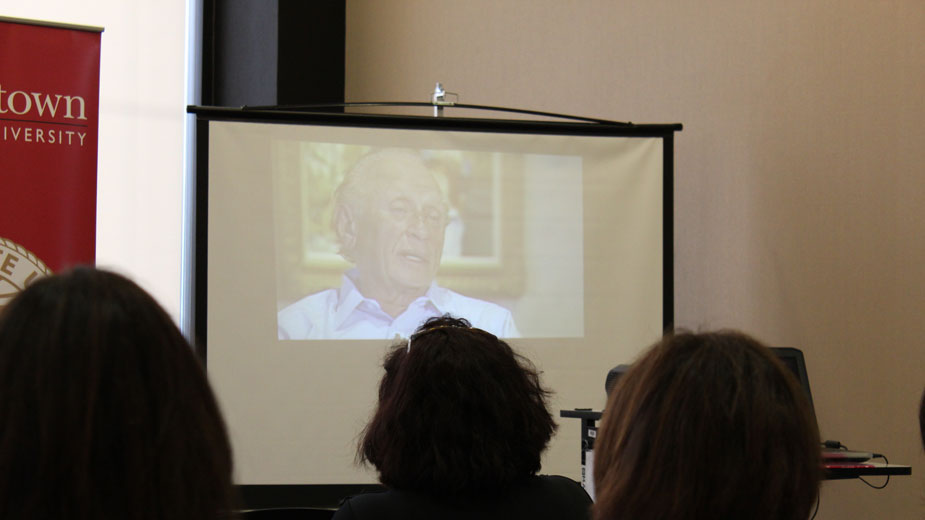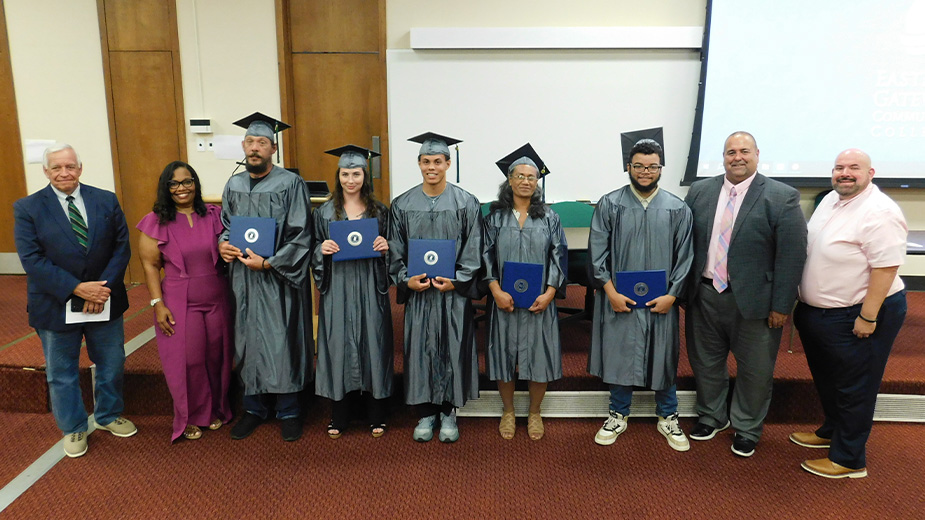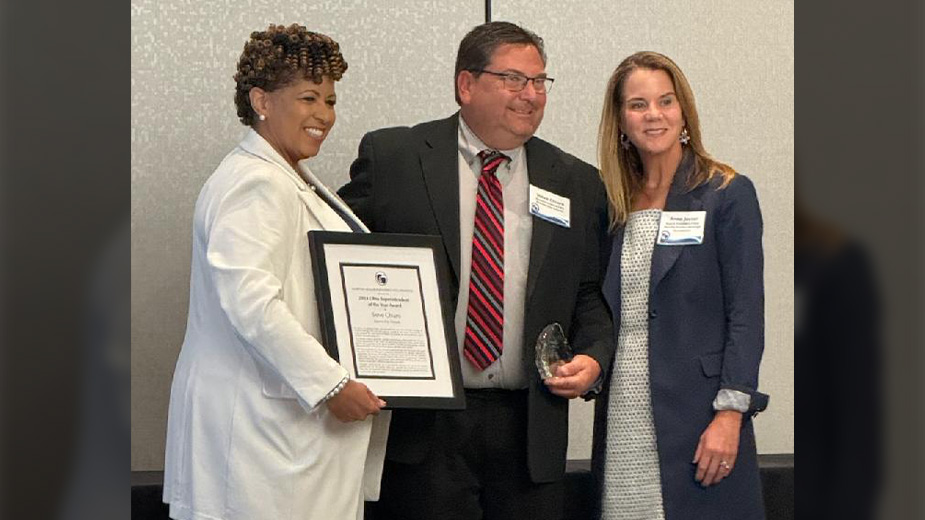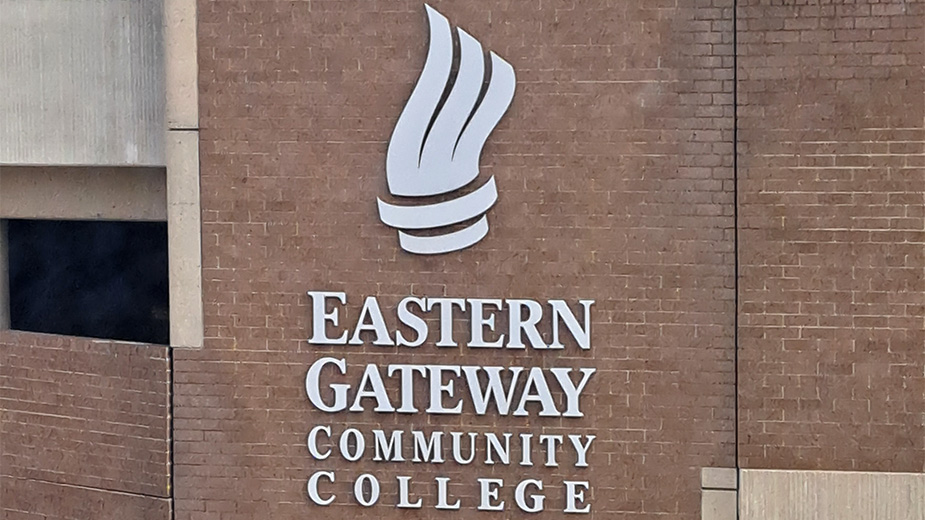YSU Is New Home for Holocaust Interviews
YOUNGSTOWN, Ohio – Although he lived in Lodz, Poland, only the first 10 years of his life, Henry Kinast has fond memories of that city. In a taped interview, he recalls his brother playing pranks on him, family gatherings and shopping with his mother.
And then, in 1940, Kinast and his family fled from Lodz to Suchedniow to escape the Nazis and their persecution of the Jews. After two years, the Kinast family surrendered to the Nazis when they were taken to the Skarzysko-Kamienna labor camp, where munitions for the Wehrmacht were manufactured. It was there that he saw his mother for the last time.
The interview with Kinast, taped in the 1990s, was part of the University of Southern California Shoah Foundation Institute for Visual History and Education. Started by Steven Spielberg in 1994 following his work on “Schindler’s List,” the foundation has collected on videotape the accounts of more than 50,000 Holocaust survivors and witnesses from around the world.
Thirty survivors here provided two- to three-hour interviews for the Shoah Foundation and now, thanks to a donation from the Thomases Family Endowment of the Youngstown Area Jewish Federation, those interviews have a new home: the Centre for Judaic and Holocaust Studies at Youngstown State University. The archive is the only collection of Shoah Foundation interviews in Ohio and one of just 266 in the world.
“They made three groups,” Kinast said on the tape shown yesterday at YSU. “They sent me to one camp, my brother and father were sent to another camp and my mother to another camp maybe six miles from us. This was the last time –” Kinast said, his voice dropping off, overcome with emotion.
The video cuts to Kinast resuming his testimony a few minutes later, tears in his eyes and tissue in hand.
“This was the last time I saw my mother. She went with a German officer and told him she had some money and two kids and said, ‘Send them to the same camp.’ And they sent her to Treblinka. She was 35 years old.”
For the next three years, Kinast spent time in other concentration camps, ending up at Buchenwald in 1945, four months before the Allies liberated the death camp. From there, he moved to Sweden where he was reunited with his father and brother. Kinast got a job as a machinist, using the skills he had learned in the concentration camp.
“They said they were looking for machinists with four or five years of experience,” he said. “I told them I worked on machines during the war and to try me out to see how I do.”
He married and, after he and his wife, Inga, had their first child, and moved to the Mahoning Valley, almost a decade after World War II ended. In 1962, Kinast founded PSK Steel Corp., now based in Hubbard.
More than 180 survivors of the Holocaust lived in the Valley, anywhere from six weeks to the rest of their lives, said Bonnie Deutsch Burdman, director of community relations and government affairs for the Youngstown Area Jewish Federation. They became doctors and steelworkers, teachers and business owners.
“History should be learned and honored through the voices of those who lived it and survived it,” said Kristine Blair, dean of the College of Liberal Arts and Social Sciences. “This archive sustains those narratives of survival and serves as a vital reminder that our future as a peaceful and just world is dependent on never forgetting the lessons of the past.”
The archives are open to the public in Maag Library. Staff and students at the university can access the videos on-campus and remotely through a special login. Having the archive, Blair noted, will attract researchers from around the globe and make the university a new center of Holocaust research.
Before this donation, said Helene Sinnreich, director of the Center for Judaic and Holocaust Studies, the nearest archive was at the University of Michigan, a 3½-hour drive.
“We went from library to library, from university to university,” said Brad Rosenthal, a graduate student at YSU who used Shoah Foundation archives at other schools. “On a tangible level, this is as clear as it’ll get. You know where they were, what they experienced and how they’re tied to Youngstown, which everyone is extremely interested in.”
During the announcement in DeBartolo Hall, which houses the center, all agreed that having the videos available benefits the entire Mahoning Valley, not just researchers. As the last Holocaust survivors die, noted Deutsch Burdman, it becomes more and more important to pass their stories on to new generations.
“This isn’t anything they lived through. It’s old history,” she said. “By creating these films about local people and showing how they had an impact locally, it hopefully brings them to life, makes things a little more current and helps people think critically moving forward.”
In the past year, the Jewish Federation has made a dozen visits to area schools as part of an educational outreach program. The federation has three videos and two exhibits that are available to use for free.
“With everything going on today, it’s important to teach about tolerance and hate,” she said. “What better way than to teach about the Holocaust and the things that gave rise to that terrible moment in history? Learning about it can prevent it in the future.”
Beyond just general Holocaust education, Sinnreich added, having community members tell their stories also plays an important role in how students learn. Rather than hear from someone who hails from the other side of the country or even a different nation, they learn the direct connection with someone from the Mahoning Valley.
“These are survivors who may have lived on the same streets or gone to the same places or started businesses that they’ve been to,” she said. “Like many immigrant groups, they had a tremendous impact on the Valley. … A community like Youngstown that has a significant survivor community is blessed to have a collection like this and learn about their own history.”
Pictured: Henry Kinast tells his story on a videotape viewed Wednesday during a press event announcing the donation.
Copyright 2024 The Business Journal, Youngstown, Ohio.



